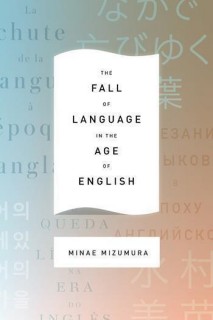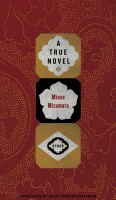 Author: Minae Mizumura
Author: Minae Mizumura
Translator: Mari Yoshihara and Juliet Winters Carpenter
U.S. publisher: Columbia University Press
ISBN: 9780231163026
Released: January 2015
Original release: 2008
Awards: Kobayashi Hideo Award
Currently, only two major works by Minae Mizumura have been translated into English. The first, and one of the best works of literature that I’ve read in recent years, was A True Novel. More recently, the English-language edition of Mizumura’s first nonfiction work, The Fall of Language in the Age of English, was released, published in 2015 by Columbia University Press with a translation by Juliet Winters Carpenter (who was also the translator for A True Novel) and Mari Yoshihara. The Fall of Language in the Age of English is actually a revision of its Japanese counterpart, Mizumura rewriting portions of the book, most notably the final chapter, to better suit a non-Japanese audience. The Fall of Language in the Age of English caused something of a stir when it was originally published in Japan in 2008—the work won a Kobayashi Hideo Award, became a commercial success, and even sparked some amount of controversy.
Mizumura opens The Fall of Language in the Age of English with a personal account of her participation in the University of Iowa’s International Writing Program in 2003. Afterwards, Mizumura, who studied French and French literature at Yale, proceeds to outline the rise and fall of French as one of the world’s universal languages. She then discusses the concept and role of universal languages, the development of local languages into national languages, and the relationships among the three in general before specifically turning to the emergence of Japanese as a national language. From there Mizumura describes what she calls the miracle of modern Japanese literature, shedding further light upon its peculiar evolution and how it came to be considered a major world literature. Mizumura then addresses the current prevalence of English and its spread before closing with what she sees as the possible futures in store for non-English languages in the digital age.
The Fall of Langauge in the Age of English is an immensely readable and engaging work examining the place of literature, national languages, and translation in a world in which English increasingly dominates. In addition to the main text, The Fall of Language in the Age of English also includes a newly-written preface by Mizumura specifically for the English-language edition of the work, an introduction by the translators, notes, a selected bibliography, and an index. The volume is written in a very approachable manner and is intended for a general audience, Mizumura presenting ideas and concepts clearly and eloquently. I happen to already have a particular interest in the subject matter of language (I even once seriously considered pursing a career in translation or linguistics), but no specialist knowledge is needed to read, understand, or enjoy The Fall of Language in the Age of English.
I found The Fall of Language in the Age of English to be utterly fascinating. The work deftly combines many differing elements together into a single, coherent whole—autobiography, history, linguistics, literary criticism, and so on. Mizumura begins by examining language and writing from a very personal perspective before placing her experiences within a greater context. She shows how geopolitical circumstances allowed Japanese language and literature to initially develop and flourish and how those circumstances now place them in danger of becoming obsolete in the worldwide arena. Language, culture, and power are all inherently and inextricably intertwined. Though The Fall of Language in the Age of English warns of what could be lost if national languages and literatures are allowed to decline unabated, Mizumura doesn’t come across to me as fatalistic or alarmist, believing there is still time to establish efforts to nourish and ensure the preservation and importance of non-English languages, cultures, and literatures.

